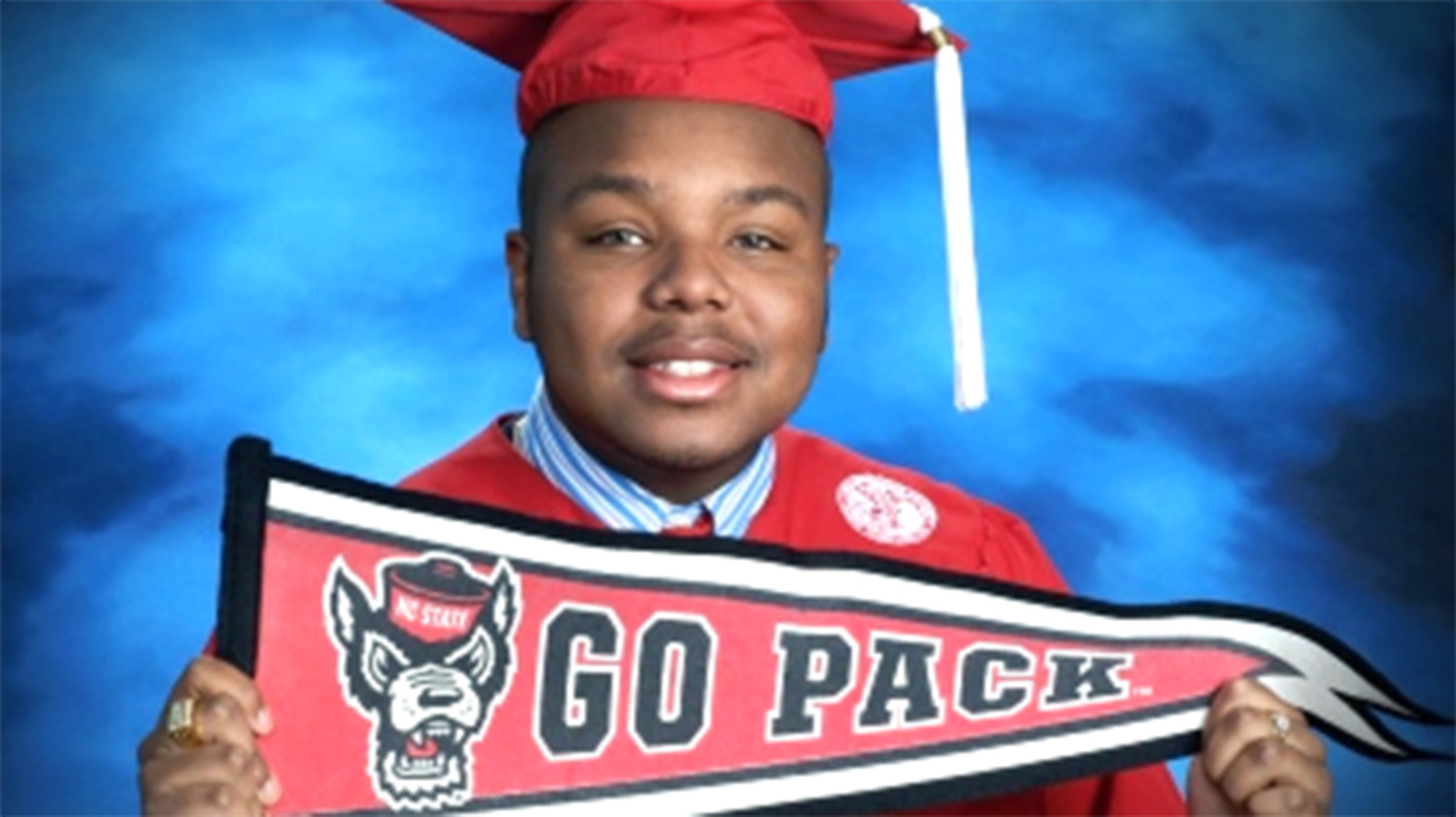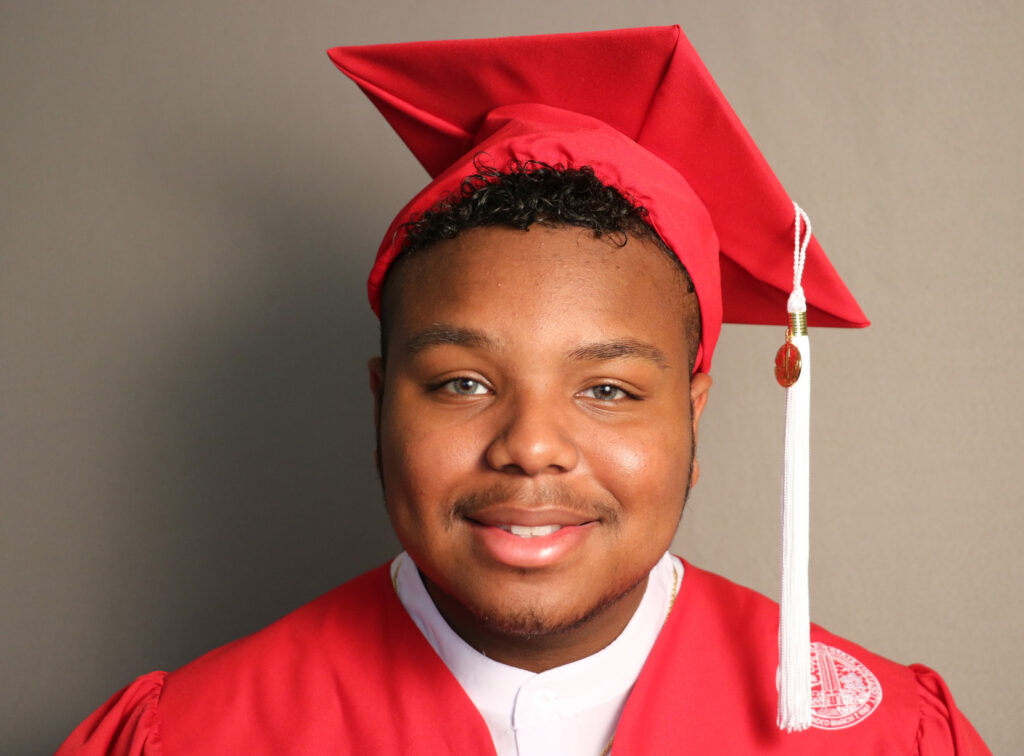A Historic Graduation
Eighteen-year-old Messiah Williams is one of the youngest Black male graduates in NC State history.

Like many 18-year-olds across North Carolina, Messiah Williams spent April and May getting ready for graduation – taking pictures in his cap and gown, inviting friends and family to the ceremony and lining up future plans.
However, unlike most 18-year-olds, those future plans don’t involve selecting college undergraduate courses and preparing to adjust to life on a college campus. He’s already done that, you see. At the ripe age of 18, Williams received his undergraduate degree in agricultural business management with a concentration in biological science from NC State last month, making him one of the youngest Black male graduates in the university’s history.
My time at NC State was an exceptional and remarkable journey of personal growth, development, and self-discovery.
“My time at NC State was an exceptional and remarkable journey of personal growth, development, and self-discovery, and I’ve learned that it’s not just about academic success but also the lessons you learn, the person you become, and the selfless efforts of helping others along the pathway of life,” Williams said.
Before attending NC State in the fall of 2021, Williams achieved a lot at a young age. This included obtaining his Network Foundation and Operating System Certificates, as well as his associate degrees in arts, science, education, and engineering at Johnston Community College by the age of 14. Then, transitioning to NC State at 14 was a great path forward in his academic journey.

Williams’s credentials were the gateway that helped him gain full academic scholarship offers from over 60 different colleges and universities around the country. With an impressive array of scholarships to choose from, his ultimate choice was fulfilled by the personal connections and support he received from his campus tour at NC State, especially the TRIO program.
It’s programs like TRIO, which are dedicated to helping students overcome class, social, and cultural barriers to higher education, that are instrumental in students like Williams’ unique college experience.
“I am very grateful to the TRIO team and want to give back in helping other students like myself to be successful in achieving their academic endeavors, especially after I finish getting my master’s,” Williams said. “It’s really been a great opportunity that they’ve provided me with over these last three years.”
Over his three years at NC State, Williams has formed pivotal relationships with the Agricultural and Resource Economics Director of Undergraduate Program John Russ, who has mentored him throughout his time at NC State. Through Dr. Russ’s mentorship, Williams accompanied the Agriculture Business Management Office of Student Mentoring on various educational and learning events, including a trip to the Outer Banks, farms across North Carolina, and the Washington, DC Learning Journey. Williams gained new friendships with his fellow students and solid business and corporate relationships.
Also, Williams gained a heightened level of personal success and knowledge through the TRIO program and extended family with the staff members.
He also has that social and emotional maturity to engage with classmates and peers.
For TRIO’s leadership, those interpersonal relationships with his peers are where Williams’ maturity beyond his years really shines. Sarah Wright, TRIO Programs’ assistant director, explained that part of the program’s offerings focus on community building and cultural enrichment experiences to enhance the students’ lives beyond the classroom, including volunteering with the local food bank and attending entertainment trips to plays and concerts.
On those trips, Wright has observed Williams seamlessly interacting with other students sometimes six to seven years older than him, and positively impacting the experiences of his TRIO peers
“Those other students never knew his age at all,” Wright said. “He not only has the intellectual maturity and strength of character to excel in 400-level courses that challenge critical thinking skills, but he also has that social and emotional maturity to engage with classmates and peers.”
Williams is also a member of the Phi Beta Kappa Society, Engineering Mentorship clubs, the NC State Sustainability Club, Latin Club, A2F Fellowships, DeSIRE, Mentor, Student Leadership and Engagement, and the Women and Minority Engineering Program.
Williams has completed over 220 student volunteer hours and works with Helping Education, a nonprofit dedicated to helping children and parents in the foster care system with reading intervention programs.
“It’s quite the rewarding experience to see the kids get overjoyed when they get past their reading goals,” Williams said. “We play educational games with them to help them increase their pace in reading and become more fluent in their reading ability and confidence. .”
Wright said that Williams is a direct example of the value of TRIO’s commitment to providing a holistic college experience for students, especially with its community-building and cultural enrichment programs.
He’s also a direct example of Department of Education TRIO’s mission since its founding in the 1960s as a response to colleges being built for a “typical student” based on age, race, gender, income level etc.
“There is no typical student,” Wright said. “Messiah’s a great example of that. There is no typical student who can be successful at NC State.”
After graduating in May, Williams will attend UNC Pembroke and pursue a master’s degree in business analytics. He then plans to undergo officer training, join the United States Space Force (USSF) and advance his education by getting accepted into a medical or doctoral program during his military service.
As one of the youngest Black male graduates in NC State history, Williams hopes to be looked upon as an example and role model for other young Black male students.
When asked if he had any future plans with NC State, he stated that his plan is “to give back to NC State, not only financially, but in action,” ranging from involving himself in mentor programs to supporting research initiatives.
“I hope to share this journey to inspire others who might find themselves in similar situations,” Williams said. “Whether through speaking engagements, mentoring or writing, my story could offer valuable insights into the importance of support systems for young college students, especially those who start at an unusually young age. Additionally, the skills and resilience I’ve developed during my time here are assets that will likely serve me well in my future endeavors. Reflecting on these experiences could help me identify specific areas where I want to impact others, be it further academic pursuits, professional ventures or community service.”
This post was originally published in DASA.
- Categories:


